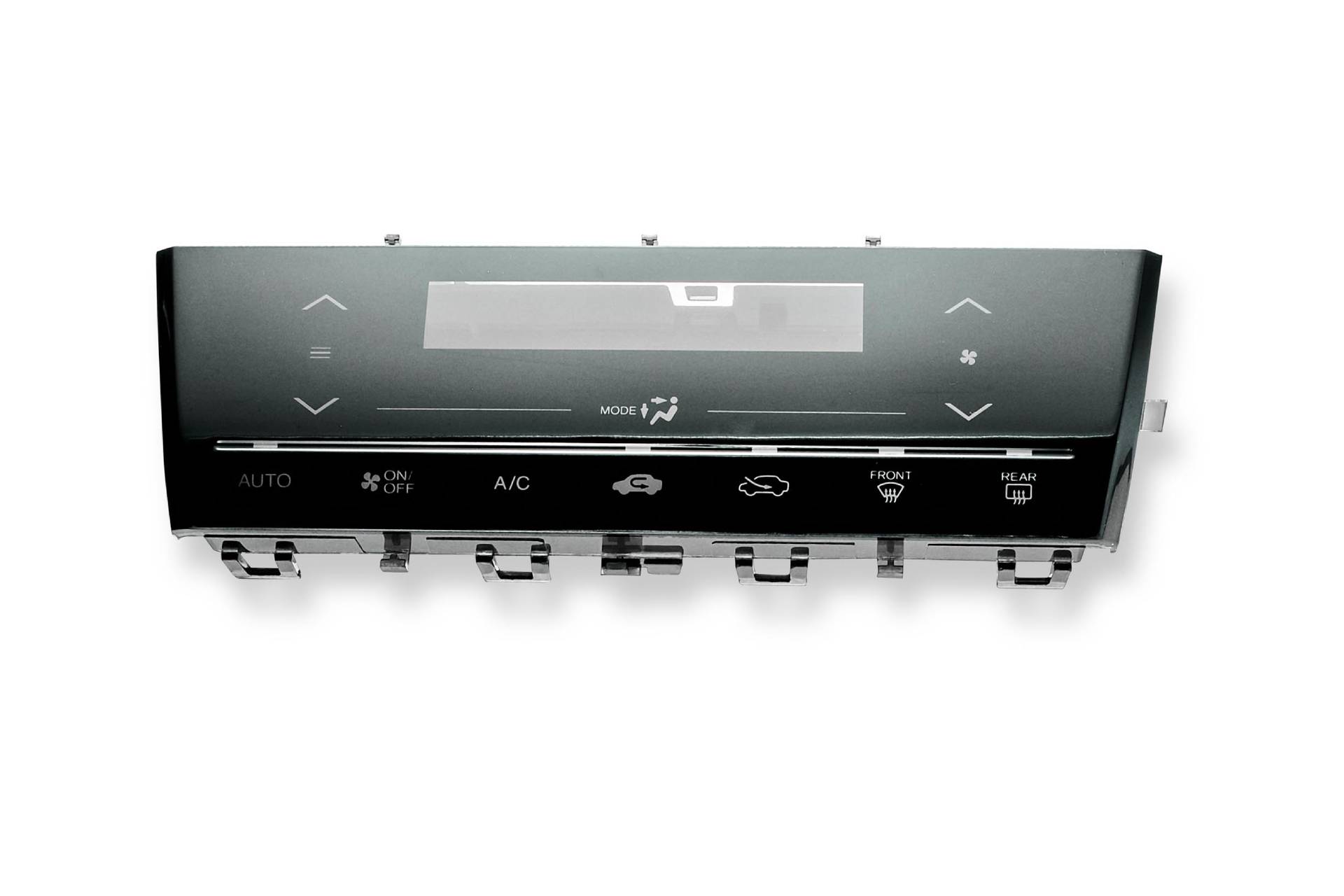Exactly How Plastic Nameplates Are Produced: A Comprehensive Overview to Their Production Refine
The production of plastic nameplates involves a number of specific actions, beginning with the selection of ideal products to the final finishing touches. Each phase is critical, guaranteeing the product fulfills specific needs for toughness and looks. Various manufacturing techniques play a significant duty in crafting these nameplates. Recognizing these procedures can clarify the intricacies behind what may appear like a straightforward item. What factors add to the top quality and personalization of these nameplates?
Recognizing Plastic Products Utilized for Nameplates

The Style Process: From Idea to Model
The design procedure for plastic nameplates begins with a clear concept that overviews the overall production. Developers work together with clients to define the function, design, and details needs of the nameplate. This preliminary stage includes brainstorming sessions, mapping out ideas, and choosing colors and fonts that line up with branding goals.Once the principle is established, designers make use of computer-aided style (CAD) software program to produce thorough digital representations. These models enable for visualization and changes prior to moving forward. Comments from stakeholders is indispensable throughout this phase, as it assists fine-tune the style to meet expectations.After completing the electronic prototype, a physical model might be generated, typically via strategies like 3D printing. This tangible representation enables additional examination of visual appeals and functionality. On the whole, the design process is a crucial action that lays the structure for the efficient manufacturing of high-grade plastic nameplates.
Reducing and Shaping the Plastic
In the cutting and shaping stage of plastic nameplate production, the option of materials plays a crucial duty in figuring out the last item's top quality and sturdiness (Plastic Nameplates). Different precision cutting methods, such as laser cutting and CNC machining, assurance that the plastic is shaped with accuracy and consistency. This combination of careful product option and advanced reducing methods is important for producing high-quality nameplates

Material Choice Refine
Choosing the best material is crucial for creating top notch plastic nameplates. Various kinds of plastics are offered, each offering distinct benefits and features. Common selections include acrylic, polycarbonate, and PVC. Acrylic is favored for its clarity and UV resistance, making it optimal for outside applications. Polycarbonate, recognized for its toughness and effect resistance, is ideal for atmospheres that need enhanced defense. PVC is typically picked for its cost-effectiveness and convenience in style. The selection process additionally considers variables such as surface, density, and shade surface, which can substantially affect the final appearance and capability of the nameplate. Inevitably, the chosen material needs to align with the planned use and visual objectives of the plastic nameplate.
Precision Trimming Strategies
While selecting the appropriate material lays the foundation, precision cutting methods play a necessary role fit the plastic nameplates into their final forms. Numerous techniques, consisting of laser cutting, CNC milling, and die cutting, are used to accomplish precision and uniformity. Laser reducing utilizes focused light to create clean edges and intricate designs, ideal for intricate patterns. CNC milling supplies versatility by removing excess product with accuracy, fitting various densities and forms. Die cutting, on the other hand, enables automation of uniform pieces, improving effectiveness. Each method is selected based upon the design specs and the preferred surface, making sure that the end product satisfies quality standards and client assumptions while keeping resilience and aesthetic allure.
Printing Strategies for Modification
Just how can producers achieve precise and vibrant designs on plastic nameplates? The answer lies in numerous printing strategies tailored for personalization. Digital printing has acquired appeal as a result of its ability to generate high-resolution photos and complex layouts directly onto plastic surface areas. This approach enables fast turnaround times and marginal configuration prices, making it perfect for brief runs and personalized orders.Screen printing remains an additional widely made use of strategy, specifically for larger amounts. It involves creating a pattern and using layers of ink, causing rich shades and resilience. UV printing, which utilizes ultraviolet light to treat the ink, is also effective, giving superb attachment and resistance to fading.Additionally, pad printing supplies adaptability for irregularly shaped nameplates, permitting Your Domain Name comprehensive styles on tough surfaces. These printing techniques allow suppliers to satisfy varied client requires while making sure quality and longevity in their plastic nameplate products.
Surface Treatments and Finishing Options

Top Quality Control Procedures in Manufacturing
Guaranteeing the greatest criteria of high quality control throughout the manufacturing of plastic nameplates is essential for preserving product honesty and client contentment. Suppliers execute extensive assessment methods at various phases of the manufacturing process. Originally, basic materials undergo comprehensive testing to validate they fulfill requirements for sturdiness and color uniformity. During the molding stage, automated systems monitor parameters such as temperature level and pressure to avoid defects.In addition, aesthetic examinations are carried out to determine any surface blemishes or imbalances. When the nameplates are generated, they undergo functional examinations, including bond examinations for printed aspects and tension examinations for sturdiness. Quality assurance teams commonly employ analytical tasting approaches to evaluate sets, ensuring that any kind of deviations from standards are promptly addressed. This thorough technique not only boosts item high quality yet also promotes depend on with customers, verifying the manufacturer's dedication to excellence in every nameplate produced.
Product packaging and Distribution of Finished Nameplates
The product packaging and circulation of completed plastic nameplates are important actions in guaranteeing they reach customers in ideal problem. Numerous packaging materials are selected to shield the nameplates during transportation, while delivering methods are carefully picked based on effectiveness and cost-effectiveness. In addition, reliable storage options are applied to preserve top quality up until the nameplates are provided.
Packaging Materials Used
When distributing finished plastic nameplates, choosing suitable packaging products is vital to ensure their security during transportation. Typically used products include bubble cover, foam padding, and cardboard boxes, all created to support the nameplates against effects and shocks. Bubble cover supplies an adaptable barrier, while foam extra padding assurances that nameplates continue to be securely in area, lessening the danger of scrapes or damage. In addition, strong cardboard boxes are utilized to contain the nameplates, using structural assistance and defense from outside components. Labels might be applied to indicate handling instructions or breakable contents, additionally boosting security throughout transportation. In general, using high-grade product packaging materials substantially contributes to the honesty and presentation of the completed plastic nameplates upon arrival at their destination.
Delivering Techniques Used
Effective distribution of ended up plastic nameplates depends on different delivery approaches that ensure prompt and safe delivery. Business commonly utilize courier services, freight shipping, and post offices, depending on the size, weight, and location of the plans. For regional deliveries, copyright solutions offer fast transit, making sure nameplates get to clients rapidly. For bigger orders, products delivery is chosen, using vehicles or shipping containers to move mass amounts successfully. Postal solutions offer as an affordable alternative for smaller sized deliveries, particularly for domestic shipments. All delivery approaches focus on safety packaging to stop damage throughout transit. Tracking systems are also utilized to keep track of shipments, supplying customers with real-time updates and reassurance concerning the condition of their orders.
Storage Space Solutions Implemented

Frequently Asked Questions
What Types of Companies Commonly Make Use Of Plastic Nameplates?
Plastic nameplates are frequently made use of by numerous businesses, consisting of offices, health centers, manufacturing facilities, and institutions. These nameplates offer vital features such as identification, details display screen, and branding, adding to business efficiency and expert look throughout varied environments.
For how long Does the Entire Production Process Take?
The production procedure period varies based upon intricacy and quantity, typically varying from a few days to numerous weeks. Factors affecting this timeline consist of design authorization, material schedule, and manufacturing techniques employed by the company.
Can Plastic Nameplates Be Recycled After Usage?
Plastic nameplates can be recycled, given they are made from recyclable materials. Nonetheless, the schedule of recycling programs and regional regulations may affect their recyclability. Appropriate disposal practices are important to guarantee efficient recycling.
What Are the Environmental Effects of Plastic Nameplate Manufacturing?
The environmental effects of plastic nameplate production include carbon emissions, resource depletion, and pollution from manufacturing procedures. Plastic Nameplates. Furthermore, inappropriate disposal contributes to plastic waste, negatively affecting ecological communities and wild animals, highlighting the demand for sustainable practices
Exist Any Type Of Safety Interest In Plastic Nameplates?
Security problems relating to plastic nameplates mainly include possible chemical direct exposure during production and the risk of materials deteriorating gradually, which may result in dangerous substances being launched, influencing both human wellness and the atmosphere. While various products can be used for nameplates, plastic remains a popular selection due to its flexibility and toughness. In the cutting and shaping phase of plastic nameplate production, the option of materials plays an important function in determining the final product's quality and sturdiness. Picking the best product is essential for producing top quality plastic nameplates. While selecting the suitable product lays the foundation, accuracy cutting methods play a vital duty in forming the plastic nameplates into their last forms. When dispersing ended up plastic nameplates, picking ideal packaging materials is crucial to guarantee their defense throughout transportation.